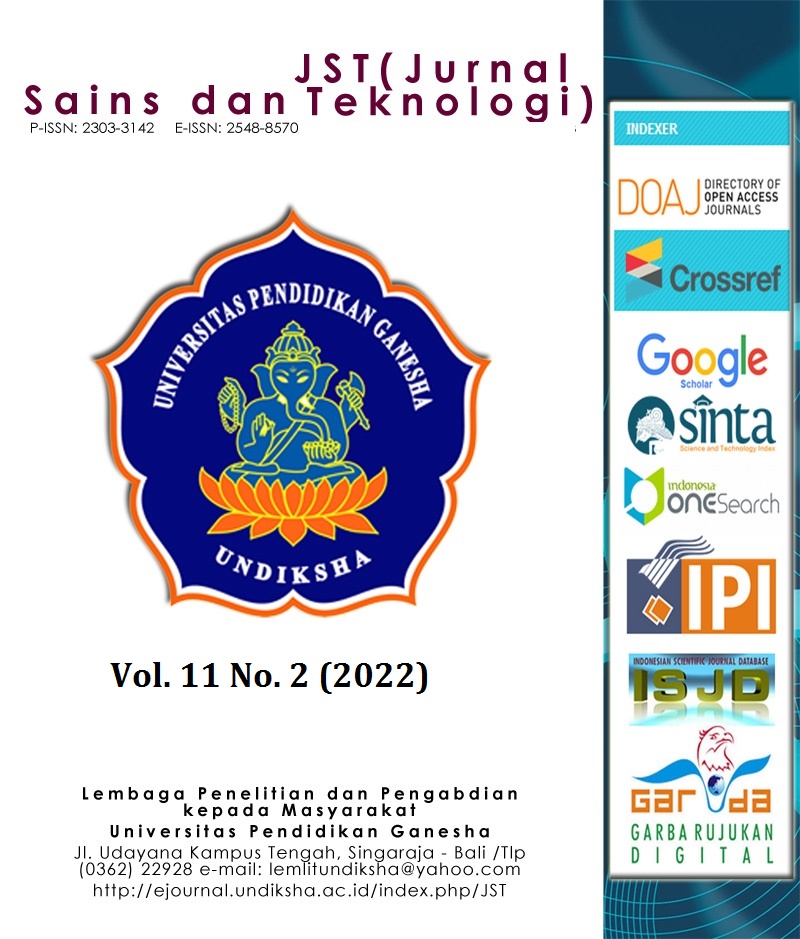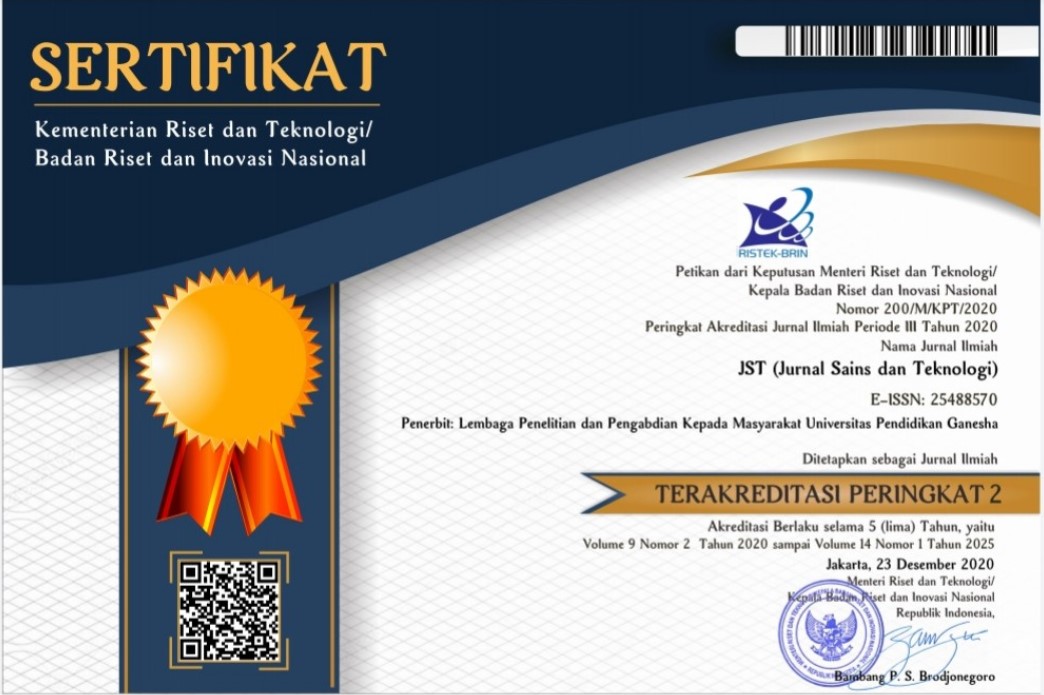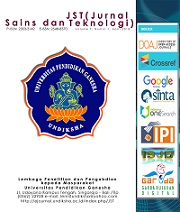Various Comparisons of White Sticky Rice with Red Rice Toward the Volume of Brem Drink and Organoleptic Test Tape Foods
DOI:
https://doi.org/10.23887/jstundiksha.v11i2.51055Kata Kunci:
characteristics of red rice tape, various comparisons, brem drink volumes produce, organoleptic and hedonic testAbstrak
Tape is a type of food that contains alcohol caused by fermentation of yeast to white sticky rice. New
innovation of tape food industry made tape foods that benefit to health is red rice tape food.
Red rice (Oryza nivara) in manufacture of tape food was a mixture of glutinous rice with red
rice. The affect the nutritional value of the red rice tape especially different fiber and antioxidant
content with glutinous of tape as new innovation of health food. The purpose of this study was
to make tape food made from the ratio of glutinous rice with red rice to the resulting brem drink
volume and organoleptic test of tape foods. Research objectives was to determine brem drink
volumes from making tape foods with various comparisons white sticky rice and red rice and
organoleptic test of red rice tape foods. This research using 3 design were: true experimental
research for treatment red rice tape toward brem drink volumes; quasy experimental for
measurement scores organoleptic and hedonic tests and pre experimental for number of
panelist. The data collection from number of brem drink volumes and organoleptic and
hedonic test. Analysis of brem drink volumes caused by treatment using ANOVA and if there
was significant different analysis by LSD test using pos hoc test. Organoleptic and hedonic
tests was to determine scores each organoleptic and hedonic test by panelist. The results of
the ANOVA analysis on the volume of brem drink produce from the three treatments show
significant differences. The LSD test show that the various in the ratio of glutinous rice: red
rice 3:1 is significantly different toward treatment 1:1 and toward treatment 1:3. The treatment
of the ratio of glutinous rice : red rice 1 : 1 is not significantly different from the comparison
treatment of glutinous rice : red rice 1:3. The organoleptic and hedonic test and the
characteristics produce from red rice tape, evaluations by scores of organoleptic and hedonic
tests.
Referensi
Abdillah, J., Nugraheni, W., & Suprihati. (2014). Pengaruh Dosis Ragi dan Penambahan Gula Terhadap Kualitas Gizi dan Organoleptik Tape Biji Gandum. Agriculture and Agricultural Science Procedia, 26(1). https://doi.org/10.24246/agric.2014.v26.i1.p75-84.
Akbar, M. R., & Yunianta, Y. (2014). Pengaruh Lama Perendaman Na2s2o5 Dan Fermentasi Ragi Tape Terhadap Sifat Fisik Kimia Tepung Jagung [In Press April 2014]. Jurnal Pangan dan Agroindustri, 2(2).
Almeida, R. L. J., Rios, N. S., & Santos, E. S. dos. (2022). Modification of red rice starch by a combination of hydrothermal pretreatments and α-amylase hydrolysis. Carbohydrate Polymers, 296. https://doi.org/10.1016/j.carbpol.2022.119963.
Beerelli, K., Balakrishnan, D., & Surapaneni, M. (2019). Evaluation of yield and seedling vigour related traits of Swarna/ Oryza nivara backcross introgression lines under three environment conditions. Ecological Genetics and Genomics, 11. https://doi.org/10.1016/j.egg.2019.100036.
Citraresmi, A., Kumalaningsih, S., & Santoso, I. (2014). Production System Analysis of Brem Processing Unit (Case Study: The Industrial Centers of Brem in Kaliabu and Bancong Village, Madiun District). Jurnal Sosial dan Humaniora, 17(3). https://doi.org/10.21776/Ub.Wacana.2014.017.03.6.
Djajati, S., Jariyah, & Marwati, T. I. (2013). Pembuatan Brem Padat Dengan Substitusi Filtrat Tape Umbi Talas. Jurnal Teknologi Pangan, 3(1). https://doi.org/10.33005/jtp.v3i1.427.
Fatimah, A., Risky, E., Ishmayana, S., & Eddy, D. R. (2018). Biosintesis Nanopartikel Zno Menggunakan Ragi Saccharomyces Cerevisiae Galur A12 Dan Karakterisasinya. Jurnal Kimia, 12(2). https://doi.org/10.24843/JCHEM.2018.v12.i02.p04.
Febriana, I., Zurohiana, Zikri, A., & Hatina, S. (2018). Effect of Bread Yeast (Saccharomyces Cereviseae) Concentration and Fermentation Time in The Manufacture of Bioethanol Using Banana Peel. Distilasi, 3(1). https://doi.org/10.32502/jd.v3i1.1869.
Firdausni, F. (2013). Pengaruh Konsentrasi Gula dan Ragi Dalam Pembuatan Cuka Dari Rosella (Hibiscus sabdariffa.L) Terhadap Mutu Cuka Rosella. JLI: Jurnal Litbang Industri, 3(2). https://doi.org/10.24960/jli.v3i2.626.77-83.
Gothe, R. M., Bhatia, D., & Kamboj, A. (2022). Genetic Variation for Anaerobic Germination and Emergence from Deeper Soil Depth in Oryza nivara Accessions. Rice Science, 29(4). https://doi.org/10.1016/j.rsci.2022.02.001.
Hasanah, U., Ratihwulan, H., & Nuraida, L. (2019). Sensory Profiles and Lactic Acid Bacteria Density of Tape Ketan and Tape Singkong in Bogor. Agritech, 38(3). https://doi.org/10.22146/Agritech.30935.
Islami, R. (2018). Pembuatan Ragi Tape Dan Tape (Making Yeast Tape And Tape). Jurnal Penelitian dan Pengembangan Agrokompleks, 1(2).
Kusharto, C. M., Astuti, T., Aisyah, A., Marliyati, S. A., & Rosmiati, R. (2016). Formulasi, Kandungan Gizi, Dan Daya Terima Kue-Kue Tradisional Makassar Berbasis Tepung Pupae–Mulberry (Pury) Sebagai Makanan Bergizi Masa Depan. Jurnal Gizi dan Pangan, 10(3).
Li, D., Yu, X., & Wang, P. (2021). Effect of pre-gelatinization on α-amylase-catalyzed hydrolysis of corn starch under moderate electric field. International Journal of Biological Macromolecules, 221. https://doi.org/10.1016/j.ijbiomac.2022.09.028.
Manoppo, H., & Kolopita, M. E. F. (2016). Penggunaan ragi roti (Saccharomyces cerevisiae) sebagai imunostimulan untuk meningkatkan resistensi ikan mas (Cyprinus carpio L) terhadap infeksi bakteri Aeromonas hydrophila. E-jurnal Budidaya Perariran, 4(3). https://doi.org/10.35800/bdp.4.3.2016.14945.
Manurung, U. N., Manoppo, H., & Tumbol, R. A. (2014). The Use of Baker’s Yeast (Saccharomyces Cereviciae) As Immunostimulant to Enhance Resistance of Nile Tilapia (Oreochromis Niloticus) to Aeromonas Hydrophila. Aquatic Science & Management, 21. https://doi.org/10.35800/Jasm.0.0.2014.7300.
Mujdalipah, S. (2016). Pengaruh Ragi Tradisional Indonesia Dalam Proses Fermentasi Santan terhadap Karakteristik Rendemen, Kadar Air, dan Kadar Asam Lemak Bebas Virgin Coconut Oil (VCO). Fortech, 1(1). https://doi.org/10.17509/edufortech.v1i1.3969.
Ninsix, R. (2013). Pengaruh Konsentrasi Ragi Merk Nkl Terhadap Mutu Tape Yang Dihasilkan. Jurnal Teknologi Pertanian, 2(2). https://doi.org/10.32520/jtp.v2i2.51.
Nugraha, M. I., Tamrin, & Asyik, N. (2018). Karakterisasi Sifat Fisik, Kimia, Dan Aktivitas Antioksidan Pada Beras Merah Varietas Bulo Bulo Asal Kabupaten Kolaka Dan Kabupaten Konawe Selatan. Jurnal Sains Dan Teknologi Pangan, 3(3). https://doi.org/10.33772/jstp.v3i3.4430.
Nugraha, Moch Isnaeni, Tamrin, T., & Asyik, N. (2018). Karakterisasi Sifat Fisik, Kimia dan Aktifivitas Antioksidan Pada Beras Merah (Oryza nivara) Varietas (Bulo Bulo) Asal Kabupaten Kolaka dan Kabupaten Konawe Selatan. Jurnal Sains dan Teknologi Pangan, 3(3). https://doi.org/10.33772/jstp.v3i3.4430.
Nurjannah, N., & Nurhikmah, N. (2020). Pengaruh Konsentrasi Ragi Dan Lama Fermentasi Terhadap Mutu Tape Singkong (Manihot Esculenta Crantz). Jurnal Borneo Saintek, 3(2). https://doi.org/10.35334/borneo_saintek.v3i2.1671.
Nursiwi, A., N, B. S., Supriyanto, & Rahayu, E. S. (2018). Development of the Traditional Tape Ketan into Probiotic Drink with The Supplementation of Lactic Acid Bacteria. Indonesian Food and Nutrition Progress, 15(1). https://doi.org/10.22146/ifnp.33387.
Parwati, N. N., Ristiati, N. P., & Atmadja, A. T. (2021). Atmadja, A. T., Tabanan, D. M., & Cake, R. (2020). Diversifikasi Produk Beras Merah Cendana Sebagai Pewarna Alami Makanan. 4: 86–94. https://doi.org/. Jurnal Puruhita, 3(2). https://doi.org/10.15294/puruhita.v3i2.53129.
Purwanti, L., & Dasuki, U. A. (2018). Perbandingan Aktivitas Antibakteri Tape Ketan Putih Dengan Ragi NKL dan Ragi LBC terhadap Propionibacterium acnes. Prosifing Farmasi, 4(1). https://doi.org/10.29313/.v0i0.9004.
Refdi, C. W., & Fajri, P. Y. (2017). Komposisi Gizi Dan Pati Tepung Beras Rendang Dari Beberapa Sentra Produksi Di Kota Payakumbuh Sumatera Barat. Jurnal Teknologi Pertanian Andalas, 21(2). https://doi.org/10.25077/jtpa.21.1.40-44.2017.
Serfiyani, C. Y., Hariyani, I., & Serfiyani, C. R. (2020). Pelindungan Hukum Terhadap Minuman Alkohol Tradisional Khas Indonesia. Negara Hukum, 11(2). https://doi.org/10.22212/jnh.v11i2.1672.
Sutharut, J., & Sudarat, J. (2012). Total anthocyanin content and antioxidant activity of germinated colored rice. International Food Research Journal., 10(1).
Tiara, C. (2021). Pengaruh pemberian dosis ragi tapai terhadap sifat organoleptik dan pH tapai pisang gedah. Prosiding Seminar Nasional Biologi, 7(1). https://doi.org/10.24252/psb.v7i1.23412.
Udin, J., Nurlaelah, I., & Priyanto, A. (2020). Pengaruh Kadar Konsentrasi Saccharomyces Cereviciae Terhadap Sifat Organoleptik Dan Sifat Kimia (Alkohol Dan Gula) Pada Brem Cair Ipomea Batatas L. Edubiologica Jurnal Penelitian Ilmu dan Pendidikan Biologi, 8(1). https://doi.org/10.25134/edubiologica.v8i1.2982.
Wang, X., Wang, W., & Tai, S. (2022). Selective and comparative genome architecture of Asian cultivated rice (Oryza sativa L.) attributed to domestication and modern breeding. Journal of Advanced Research. https://doi.org/10.1016/j.jare.2022.08.004.
Widiyanti, N. L. P. M., Mulyadiharja, S., Santiasa, I. M. P. A., & Anjasmara, K. R. I. (2018). Analysis Of Galangal (Alpinia Galangal) Extract as Natural Preservative Tofu Against Serum Glutamate Pyruvate Transaminase (SGPT) Levels and Hepatic Tissue Structure of White Rat (Rattus Norvegicus) Wistar Strain. Journal Of Physics: Conference Series, 1116(5). https://doi.org/10.1088/1742-6596/1116/5/052075.
Winarti, W., Bayu, E. S., & Damanik, R. I. (2018). Keragaan Morfologi dan Kandungan Antosianin Padi Beras Merah (Oryza sativa L.) di Kecamatan Munte dan Kecamatan Payung, Kabupaten Karo. Jurnal Pertanian Tropik, 5(3). https://doi.org/10.32734/jpt.v5i3.3106.
Wu, T., Deng, C., & Luo, S. (2023). Effect of rice bran on properties of yogurt: Comparison between addition of bran before fermentation and after fermentation. Food Hydrocolloids, 135. https://doi.org/10.1016/j.foodhyd.2022.108122.
Wulandari, N. W. P., Permana, D. G. M., & Duniaji, A. S. (2019). Pengaruh Jenis Ragi Pada Fermentasi Kakao Terhadap Karakteristik Cuka Kakao the Effect of “Ragi” O N Cocoa Fermentation to The Characteristics of Cocoa Vinegar. Itepa: Jurnal Ilmu dan Terapan Pangan, 8(3). https://doi.org/10.24843/itepa.2019.v08.i03.p11.
Yuliati, L. N., Retnaningsih, R., & Aprilia, D. (2012). Pengaruh Kelompok Acuan Terhadap Kesadaran Dan Konsumsi Beras Merah (Oriza Nivara). Jurnal Ilmu Keluarga dan Konsumen, 5(2). https://doi.org/10.24156/jikk.2012.5.2.166.
Zhao, X., Xing, J., & An, N. (2022). Succeeded high-temperature acid hydrolysis of granular maize starch by introducing heat-moisture pre-treatment. International Journal of Biological Macromolecules. https://doi.org/10.1016/j.ijbiomac.2022.10.065.
Unduhan
Diterbitkan
Cara Mengutip
Terbitan
Bagian
Lisensi
Hak Cipta (c) 2022 Ni Luh Manik Widiyanti

Artikel ini berlisensiCreative Commons Attribution-ShareAlike 4.0 International License.
Authors who publish with the Jurnal Sains dan Teknologi (JST) agree to the following terms:
- Authors retain copyright and grant the journal the right of first publication with the work simultaneously licensed under a Creative Commons Attribution License (CC BY-SA 4.0) that allows others to share the work with an acknowledgment of the work's authorship and initial publication in this journal.
- Authors are able to enter into separate, additional contractual arrangements for the non-exclusive distribution of the journal's published version of the work (e.g., post it to an institutional repository or publish it in a book), with an acknowledgment of its initial publication in this journal.
- Authors are permitted and encouraged to post their work online (e.g., in institutional repositories or on their website) prior to and during the submission process, as it can lead to productive exchanges, as well as earlier and greater citation of published work. (See The Effect of Open Access)
















